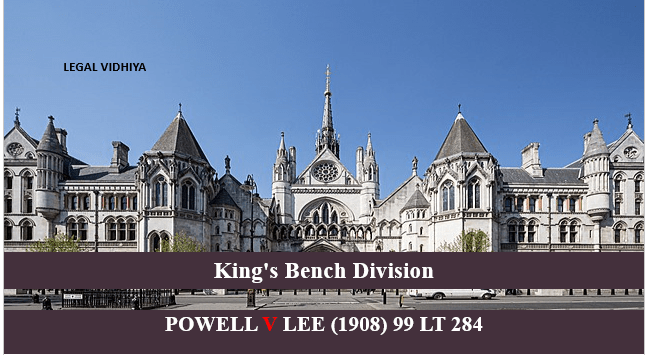
| Citation | Powell v Lee (1908) LT 284 |
| Year of judgment | 1908 |
| court | King’s Bench Division |
| Case type | Contracts |
| Appellant | Mr. Powell |
| Respondent | Mr. Lee |
| Bench | King’s Bench Division |
INTRODUCTION
A contract is a legally enforceable agreement that describes the terms and conditions of two or more parties’ mutual obligations. Contracts can involve a wide range of transactions and interactions, such as commercial agreements, employment contracts, and rental agreements, among other things. A contract must often comprise features such as an offer, acceptance, consideration, the legal ability of the parties, and a valid purpose in order to be legally binding. If one party fails to execute their contractual commitments, the other party may have legal recourse, such as requesting damages or particular performance in a court of law. Contracts define and safeguard the rights and expectations of the parties concerned.
However, there must be proper communication between the offeror and the offeree. Acceptance is the moment when both parties have to understand the rules and principles governing acceptance to make sure that the contract between both parties is valid and enforceable under contract law.
FACTS OF THE CASE
There is a job opportunity for the position of the headmaster of a school and Powell (plaintiff) is eligible to attend for the work and applied an application. The school manager referred his application to the appointing authority at that time the power was in thought that they would appoint Powell as the headmaster. the opinion of the authority was informally discussed with Powell by one of the members of the appointing authority and Powell was very happy to know this however there was no formal acceptance directly by the authority to Powell. But later the appointing authority changed their decision and appointed some other person for the position because of this Powell went to file a suit for breach of contract against the school appointing authority.
ISSUES
Whether there was a breach of contract by the school appointment
JUDGEMENT
The bench stated by referring to the evidence that there was no breach of contract initially there was no contract between the plaintiff and the management or the appointment authorities. He was not informed about the appointment through one of the persons from the authority which is not a formal acceptance by the management and was under discussions about the selection of the candidates which was not confirmed yet even the board was raising a resolution about the selection of the candidate. The plaintiff even didn’t receive any official confirmation from the management. The only official information he received was his rejection letter and he doesn’t have any defense against the appointing authority’s decision to not choose him as the headmaster for the school. The court additionally noted that there should be an authorized person on the part of the authority to convey the information to the plaintiff however here the member of the authority informally informed the plaintiff. since the acceptance was never formally conveyed to the plaintiff there was no binding contract between Powell and the school.
OBSERVATION
The king’s bench decision questioned whether the member of the appointing authority had any authority to communicate the acceptance to the plaintiff on behalf of the whole school authority. Here the answer will be “No” The member of the school authority had an unauthorized communication with the plaintiff about being selected for the headmaster job which is not valid. Hence there is no proper communication which is a necessary element for the contract. The communication should be done by the offeree himself or an authorized agent of the offeree but here the communication happened without having an authorized order from the offeree. The member of the board does not have any capacity to accept the offer from the plaintiff unless he was officially appointed by the authority of the school to communicate the acceptance. So, there was no contract between the two parties and there is no question of breach of contract.
REFERENCE
https://www.legalserviceindia.com
This Article is written by Saketi Neeharika of Damodaram Sanjivayya National Law University, Intern at Legal Vidhiya.




0 Comments